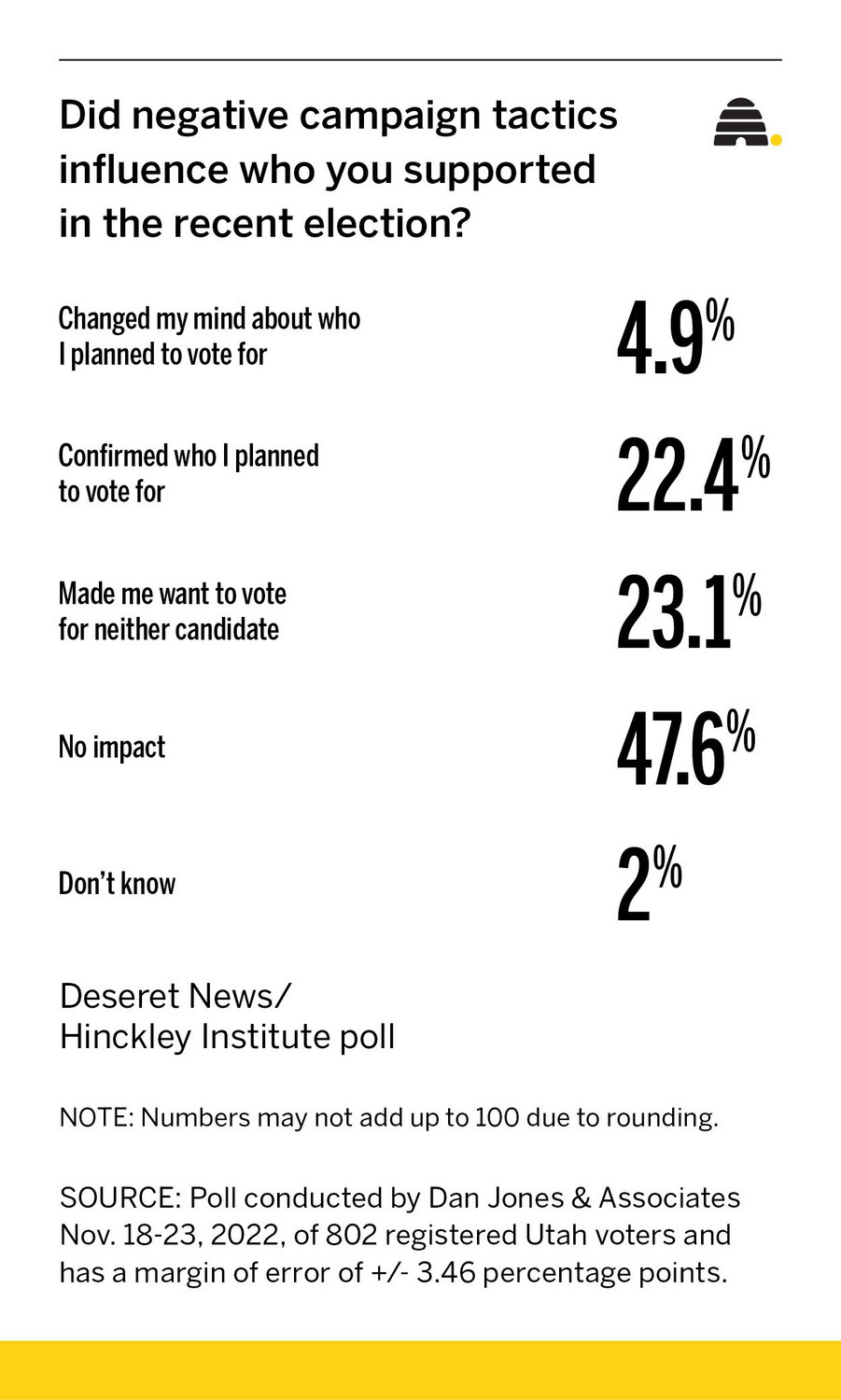Estimated read time: 4-5 minutes
This archived news story is available only for your personal, non-commercial use. Information in the story may be outdated or superseded by additional information. Reading or replaying the story in its archived form does not constitute a republication of the story.
SALT LAKE CITY — Attack ads played a prominent role in the U.S. Senate race in Utah where outside groups spent millions of dollars going after Republican Sen. Mike Lee and independent candidate Evan McMullin.
But a new Deseret News/Hinckley Institute of Politics poll shows nearly half of Utah voters say negative campaigning — which flooded the airwaves, mailboxes and social media for weeks — had no impact on who they supported in the 2022 election.
Still, the survey found almost a quarter say negative ads made them want to vote for neither candidate, while about the same amount says the ads confirmed who they planned to support.

Voters ultimately returned Lee to the Senate for a third term after a bitter battle with McMullin in what was the most expensive election ever in Utah. In addition to the outside spending, the candidates spent huge sums of money on their campaigns, including for attack ads.
With all 29 counties now reporting complete election results, Lee finished with 53.1% of the vote to 42.7% for McMullin in the closest Senate race in the state in decades. Two third-party candidates and three write-ins split the remainder of the vote.
Lee won 26 counties, while McMullin took three traditionally Democratic strongholds in Grand, Summit and Salt Lake. In an unprecedented move, the Utah Democratic Party backed McMullin instead of fielding its own Senate candidate.
Super PACs poured more than $19.2 million into the race — $10.6 million for Lee and $8.6 million for McMullin, according to OpenSecrets.com, a website that tracks election spending based on Federal Election Commission campaign finance reports. Negative ads targeting one candidate or the other accounts for about two-thirds of the spending.
Lee and McMullin also pumped millions into the election, including on ads attacking their opponent, more so in McMullin's case. Lee spent $9.7 million, while McMullin spent $5.8 million on the election.
In all, the price tag for the highly competitive contest totaled about $35 million, making it Utah's most expensive election.
Is money on attack ads well spent?
The Deseret News/Hinckley Institute poll found 47.6% of Utah voters say negative campaign tactics had no impact on who they supported in the recent election. Another 22.4% said that approach confirmed who they planned to vote for, while 23.1% said it made them want to vote for neither candidate. Only 4.9% say negative campaigning changed their mind about a candidate.
Dan Jones & Associates conducted the survey of 802 registered Utah voters Nov. 18-23. It has a margin of error of plus or minus 3.46 percentage points.
Statewide voter turnout for the 2022 election was 64.2%, according to the lieutenant governor's office, which oversees elections in Utah. Wayne County had the highest turnout at 84.1%, while Tooele County had the lowest with 59.1%.
The poll shows that 57.7% of Utahns believe that negative campaign ads make people less likely to vote, while 30% believe it makes people more likely to vote. Just under 10% said the ads have no impact.

Political observers in Utah like to say negative campaigning doesn't work in the state but that's not necessarily true. Super PACs targeting McMullin seemed to damage his image and help Lee pick up steam over the final days of the election.
"People are often startled by and pay attention to negative information in a way that they don't to positive information," Chris Karpowitz, co-director of the Center for the Study of Elections and Democracy at Brigham Young University, told the Deseret News in October.
But there's also a flip side.
"These kinds of messages can also turn people off, either to the campaign generally or to politics or to a candidate if they go too far over the line. If they're too outlandish or too extreme in their messages, that can be problematic," Karpowitz said.
The impact of negative ads appears to differ between political parties. The poll found that among respondents who self-identified as Democrats, 62.8% say people are less likely to vote because of negative messages, compared to 55.8% of those who identified as Republicans.
Negative campaigning impact on voter participation
The survey also asked Utahns how negative campaign tactics in general influence election participation in their community.
The results showed 42.9% of Utah voters think negative campaigning makes people less likely to vote, while 26.9% say it makes people more likely to vote. The remaining 30.2% say negative tactics have no impact.
Broken out by political party, 47.7% of Democrats in the survey and 41.8% of Republicans think negative campaigning decreases voter participation.
A Deseret News/Hinckley Institute poll in October found more than three-fourths of Utahns would prefer political campaigns run no ads at all as opposed to mostly negative ones.










